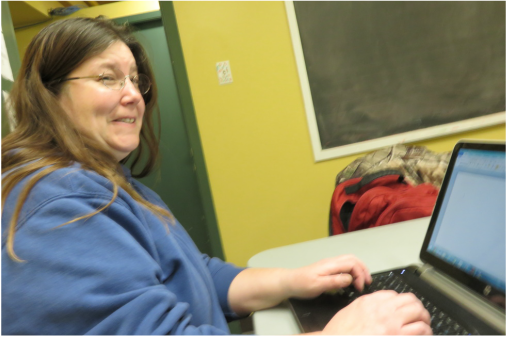I've gone through all of these. I've seen the dark days when the muse is gone. When a thirteen hour or even sixteen hour work day, eight days in a row, left me so sapped there was no room in my brain for words. I've had writing rooms so dark and uninspiring I didn't want to go in there and do what needed to be done. I've seen plots and scenes where the characters wander and nothing is happening. I've laid down my pen in defeat.
But that's not how you become a writer.
Luckily for me, I realized something. That annoying phrase those "real" writers were always spouting, "Write every day." was true. That was, if I was going to follow my dream of being a "real" writer, and by real I mean professional. I had to write, every day, no matter what.
So what does it mean, write every day? In my world it doesn't mean pen to paper or fingers to keyboard, nor does it mean a set words or a set amount of hours (unless a deadline is looming. What it does mean is that I am mindful of my work every single day. If I don't have time to throw down with the muse, I'm thinking of the next scene or couple of scenes. I work out problems over dishes, expand characters on the bus, and plot in the shower. Then when I do write - I'm ready to go.
But how does that help the museless, the uninspired, the perpetually exhausted? Well, answer this, "How bad do you want it?" How bad do you want to be a "real" writer? How far are you willing to go to chase that dream, to see this story in print? Because I've been there. I've had the stuck story, the year long writer's block, the exhaustion where I thought I was going black and white like some fuzzed out TV. None of them are a good enough reason not to write. You can make it into an excuse - but it's a lie.
If you're to0 tired when you get home from work, switch your schedule. Write before you leave, then when you get home, have supper and go to bed. I've done it. Working at a daycare left me seeing double. So I started getting up at three in the morning and writing for three hours, then heading to work. Social life? Not much. Finished play ready for stage? You bet. And that was glorious, seeing that thing up there and hearing the applause when the actors took their bows.
If you are uninspired, suck it up. I'm very rarely inspired in the beginning. Mostly I'm tired, and the screen is hurting my eyes, and I don't think I'm going to be able to pull it off. The muse only comes once I get going, and sometimes not even then. Being a professional writer doesn't come by magic, it comes after a long hard slog. So get slogging. Writers don't get finished by whining.
If your story, plot, character has fizzled out - don't stop and try a new story. Finish! Even if it's all coming up crap. Finish. Trust me, it will look better after you complete your project, put it away for a month or two. Or at the very least, it will be fixable. Instead of quitting, look over your plot and ask yourself, "what does my character want, why do they want it, and what is stopping them?" Basic goal, motive, conflict (GMC) stuff. If you have that, then look at the scene you're writing. Each scene will have the same thing (though maybe different from the over arcing plot). Finding GMO will banish pretty much any stalled out scene and evaporate most writer's blocks.
And if that doesn't work, look at your narrative structure and your theme. Do some character sketches. Do some plotting. Story doesn't happen with out pre-work, and sometimes you have to go back and get it done.
But the basic message I want to get across here is this: If you want to be a writer you have to write. No excuses. No whining. No waiting for some tingly feeling that only comes very rarely. Write everyday and finish what you start.
Now get slogging and follow that dream. You can do it. I believe in you.

 RSS Feed
RSS Feed